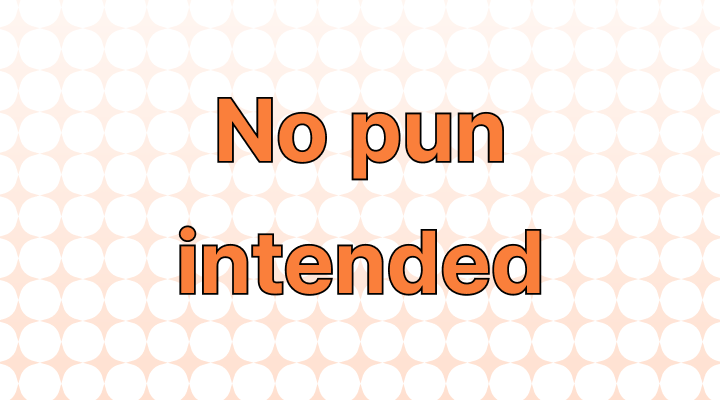- "No pun intended" is a disclaimer used after making a statement that could be interpreted as a joke or play on words, indicating that the speaker did not intend for it to be humorous or witty.
In this sentence, "no pun intended" is used to clarify that the speaker's use of the word "mind-numbing" was not meant to be a clever play on words, but rather a straightforward description of the job's tediousness.

When to use "no pun intended"
When someone uses the phrase "no pun intended," they are typically acknowledging that their statement could be misconstrued as a pun or play on words, but they want to assure the listener that they did not intend for it to be humorous. This can happen when a word or phrase has a double meaning or can be taken humorously in context. The use of "no pun intended" helps prevent any potential confusion or offense.
Example contexts:
- When using a word or phrase that has a double entendre or could be interpreted humorously.
- In written communication, such as emails or social media posts, to clarify the intention behind a potentially ambiguous statement.
The use of "no pun intended" over time
As you can see from the graph below, the phrase "no pun intended" saw fluctuations in use throughout time. The phrase began to increase in popularity in the 1940s, and it peaked in the 2000s.

Example sentences
- He's been feeling a bit down lately, spending most of his time in the cellar, no pun intended.
- The team's performance was lackluster, with their efforts falling flat, no pun intended.
- She mentioned her interest in fruit picking as a way to stay grounded, no pun intended.
- The chef described his signature dish as "heavenly," no pun intended.
- Despite the boating company's efforts to stay afloat, their financial situation continued to sink, no pun intended.
Examples from the web
"Politicians will use a range of quirks and methods to spin (no pun intended) the interview out." - The Guardian
"Ms. Reese is modeling — no pun intended — her career on Ms. Williams’s in more ways than just one." - New York Times
Other ways to say "no pun intended"
- No joke
- Seriously speaking
- In all seriousness
- Without irony
- To be clear
Summary
"No pun intended" is a phrase used to clarify that a statement was not intended as a joke or play on words, particularly when there's a risk of it being interpreted humorously. It's commonly employed in situations where a word or phrase has a double meaning or could be taken humorously out of context. By using this phrase, speakers ensure that their intended meaning is clear and prevent any potential confusion or offense.

Want to sound like a native speaker?
Engram’s AI-powered grammar checker makes your English sound like a native speaker’s, suggesting natural English expressions on top of fixing grammar, spelling, punctuation, word order, and vocabulary.

References:














